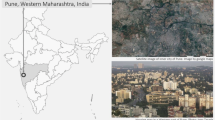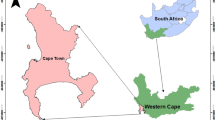Abstract
Homestead food garden (HFG) projects are supported by government which attempts to alleviate poverty in food insecure households. Despite the fact that homestead food gardens are seen as a solution to food security in the Gauteng Province and other parts of the world, the issue of unsustainability and failure of these programmes after government support ceases cannot be ignored. A household survey was conducted in the Gauteng Province by the Agricultural Research Council (ARC) and the Gauteng Department of Agriculture and Rural Development (GDARD) to establish a sustainable mechanism for homestead food gardens. The following objectives were addressed: to identify socio-economic factors that influence sustainability of homestead gardens; to identify factors influencing garden availability; and to recommend the mechanism for improving the sustainability of homestead gardens. A total of 1150 households participated and were spread as follows: City of Johannesburg (319); City of Tshwane (270); Ekurhuleni Metropolitan (141); Sedibeng (216); and the West Rand (204). Quantitative and qualitative designs were used as a questionnaire, and stakeholder discussions and field observations were part of the data collection. A purposive sampling technique was used and data was coded, captured, and analysed using the Statistical Package for the Social Sciences (SPSS). Food security status was also in line with the fact that South Africa is food insecure at a household level in contradiction to the national level. A whopping number of households interviewed were food insecure (860), as compared to households that were food secure (290). This food security situation is worrying because 695 households go to sleep at night hungry because there was not enough food and about 395 households could go the whole day and night without eating anything. It was also established that in terms of sustainability, not all household gardens are economically viable, or socially and environmentally sustainable. Nine hundred and seventy-one households agreed that gardens do not generate income, and very few households (179) emphasised that gardens were generating income. There was an almost equal response in terms of gardens supporting social initiatives. In terms of environmental sustainability, 933 households were not aware about the environmental issues. In conclusion, the majority of households felt that the HFG Programme is very good (371), good (490), and fair (191). Only a few households felt that the initiative is poor (70) and very poor (28). The majority of households felt that the support received is very good (443), good (341), and fair (166). Quite a number of households felt that the support received was poor (105) and very poor (95). Hence, some of the recommended activities to be included in the mechanism include stakeholder and community mobilisation, situational analysis, food garden inputs, nutrition education, participation of the community in homestead programme design and implementation, training, and monitoring.
Access this chapter
Tax calculation will be finalised at checkout
Purchases are for personal use only
Similar content being viewed by others
References
Akrofi S, Brouwer D, PriceL L, Struik PC (2010) Home gardens contribute significantly to dietary diversity in HIV/AIDS afflicted households in rural Ghana. J Hum Ecol 31(2):125–134
Amaza P, Abdoulaye T, Kwaghe P, Tegbaru A (2009) Changes in household food security and poverty status in PROSAB area of Southern Borno State, Nigeria. International Institute of Tropical Agriculture (IITA), Ibadan, pp 11–13
Backeberg GR, Sanewe AJ (2010) Towards productive water use and household food security in South Africa. In: Paper presented at the 6th Asian Regional Conference of ICID, 10–16 October 2010, Indonesia
FAO (Food and Agricultural Organisation) (2012) The state of food insecurity in the world: eradicating world hunger-taking stock ten years after world food summit. FAO, Rome
Greene W (1993) Econometric analysis, 5th edn. Prentice Hall, Upper Saddle River, NJS
Greenfield B, Henry M, Weiss M, Tse SM, Guile JM, Dougherty G, Zhang X, Fombonne E, Lis E, Lapalme-Remis S, Harnden B (2008) Previously suicidal adolescents: predictors of six-month outcome. J Can Assoc Child Adolesc Psychiatry 17(4):197–201
Heckman JL (1999) Casual parameters and policy analysis in economics: a twentieth century retrospective, NBER working paper 7333. National Bureau of Economic Research, Inc, Cambridge
Maponya P, Moja SA (2012) Asset portfolios and food accessibility in Sekhukhune District, Limpopo Province. J Agric Sci 4(12):144–153
Mohammadi F, Omidvar N, Houshiar-Rad A (2011) Validity of an adapted Household Food Insecurity Access Scale in urban households in Iran. J Public Health Nutr 15:1–9
Musotsi AA, Sigot AJ, Onyango MOA (2008) The role of home gardening in household food security in Butere division of western Kenya. Afr J Agric Nutr Dev 8(4):375–390
Mwale M, Sarfo-Mensah P, Zwane EM, Netshandama VO, Mudau MJ (2012) Marketability and sustainability of food security programmes: products and productivity of agricultural projects. S Afr J Agric Extn 40(1):1–15
Ndobo FP (2013) Determining the food security status of household’s status in South African township. Dissertation, North-west University (Vaal Triangle Campus), Vanderbijlpark.
Shrestha P, Gautam R, Rana, BR, Sthapit B (2001) Home Gardens in Nepal, status and scope for research and development. In: WJ. Watson & PB. Eyzaguirre (eds). Home gardens and in situ conservation of plant genetic resources in farming systems, Proceedings of the second international Home Gardens workshop. Rome, IPGRI, pp 105-117.
Stats SA (Statistics South Africa) (2017) Poverty trends in South Africa: an examination of absolute poverty between 2006 and 2015/Statistics South Africa. https://www.statssa.gov.za/publications/Report-03-10-06/Report-03-10-062015.pdf
Stats SA (Statistics South Africa) (2019). Mid-year population estimates. https://www.statssa.gov.za/publications/P0302/P03022019.pdf
Acknowledgements
The research team wishes to thank the Gauteng Department of Agriculture and Rural Development (GDARD) for funding this research. The assistance of the Agricultural Research Council-Soil, Climate and Water (ARC-SCW) towards the research is also acknowledged.
Conflict of Interest
The authors declare that they have no conflict of interest.
Author information
Authors and Affiliations
Corresponding author
Editor information
Editors and Affiliations
Rights and permissions
Copyright information
© 2021 Springer Nature Singapore Pte Ltd.
About this chapter
Cite this chapter
Maponya, P. et al. (2021). Mechanism for Improving the Sustainability of Homestead Food Gardens in the Gauteng Province, South Africa. In: Venkatramanan, V., Shah, S., Prasad, R. (eds) Sustainable Bioeconomy . Springer, Singapore. https://doi.org/10.1007/978-981-15-7321-7_14
Download citation
DOI: https://doi.org/10.1007/978-981-15-7321-7_14
Published:
Publisher Name: Springer, Singapore
Print ISBN: 978-981-15-7320-0
Online ISBN: 978-981-15-7321-7
eBook Packages: Earth and Environmental ScienceEarth and Environmental Science (R0)




